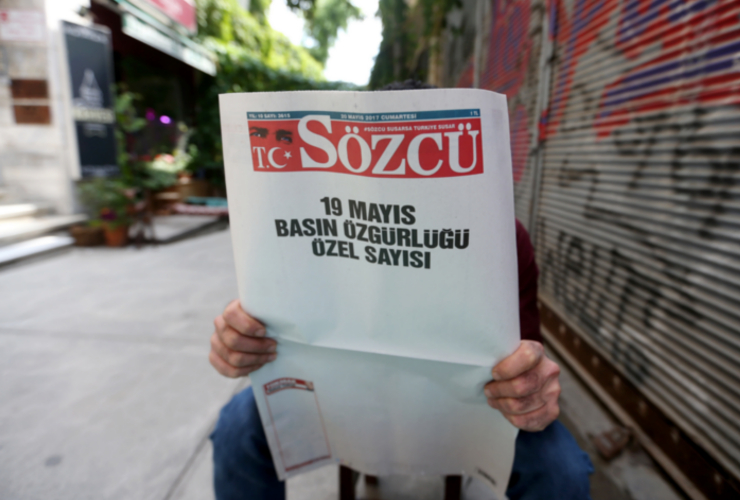Trial starts on Tuesday in Istanbul for four journalists and executives from independent daily Sözcü who were targeted for arrest in May on charges that the paper’s July 15, 2016 report on where President Recep Tayyip Erdoğan was vacationing showed complicity in the coup attempt that broke out that night.
Izmir correspondent Gökmen Ulu, online news editor Mediha Olgun and finance manager Yonca Yücekaleli face up to 15 years behind bars on a charge of supporting a terrorist organisation; owner Burak Akbay, who is being tried in absentia, faces up to 30 years on a charge that he managed an armed terror group and spread its propaganda.
Ulu was formally placed under arrest on May 26, several days after police raided Sözcü’s Istanbul offices and took him, Olgun and Yücekaleli into custody on May 19. Akbay was reportedly traveling abroad at the time and has not returned to Turkey. Yücekaleli was released, but Ulu and Olgun were placed in pre-trial detention. Olgun was released on Sept. 22, but Ulu remains behind bars some 165 days later.
A 73-page indictment accepted by the court last month reportedly cites headlines in coup-related stories in the secularist daily following the attempt and reports published ahead of the coup on the day it took place.
International Press Institute (IPI) Program Director Steven M. Ellis said the case was only the latest step by Erdoğan’s government to use the judiciary to punish critics and criminalise journalism.
“Sözcü, one of the last major independent newspapers in Turkey, has been a thorn in the side of Erdoğan and his ruling Justice and Development Party due to its fierce criticism, so it’s not surprising that authorities targeted the paper as part of the broader, ongoing crackdown on the media,” he said. “But this case appears even more patently absurd than most. Turkey should release Gökmen Ulu – who, like too many others, faces punishment without conviction – and the case should be dismissed.”
According to Sözcü, Ulu, a native of Marmaris, was in the area ahead of July 15, 2016 to look into why boats were withdrawing from a cove near the summer home of late Turkish President Turgat Özal. Observing other unusual security measures, he realized that Erdogan was vacationing at a nearby resort.
On the afternoon of the coup attempt, Sözcü published a report detailing the president’s location with the headline “Sözcü has found Erdoğan”. That evening, when the coup erupted, soldiers attacked the resort but narrowly missed the president, who reportedly had fled some 15 minutes earlier. Ulu was accused of leading the soldiers to Erdoğan, but Sözcü argues that parliamentary and other official reports into the coup show that plotters knew the president’s location before the article was published.
The indictment also accuses Sözcü of acting as a “media branch” of the “Fethullahist Terrorist Organisation” or “FETO”, the government’s name for the movement headed by U.S.-based cleric Fethullah Gülen, which Turkey blames for the coup attempt. Prosecutors say that Sözcü, despite publicly criticising Gülenists, secretly worked behind the scenes to shape public opinion in the group’s favour.
Trial is set to start on Tuesday at Istanbul’s Çağlayan courthouse.
[content_boxes settings_lvl=”child” layout=”clean-horizontal” columns=”1″ icon_align=”left” title_size=”18″ title_color=”” body_color=”” backgroundcolor=”#dcdadb” icon_circle=”” icon_circle_radius=”” iconcolor=”#dcdadb” circlecolor=”#dcdadb” circlebordercolor=”#dcdadb” circlebordersize=”” outercirclebordercolor=”” outercirclebordersize=”” icon_size=”” icon_hover_type=”” hover_accent_color=”” link_type=”” link_area=”” link_target=”” animation_delay=”” animation_offset=”” animation_type=”0″ animation_direction=”down” animation_speed=”0.1″ margin_top=”0″ margin_bottom=”0″ class=”” id=””][content_box title=”” icon=”” backgroundcolor=”#dcdadb” iconcolor=”#000000″ circlecolor=”#dcdadb” circlebordercolor=”” circlebordersize=”” outercirclebordercolor=”” outercirclebordersize=”” iconrotate=”” iconspin=”no” image=”” image_width=”35″ image_height=”35″ link=”” linktext=”” link_target=”_self” animation_type=”0″ animation_direction=”down” animation_speed=”0.1″]
Press freedom is under threat. But you can help.
To Our Readers: We need independent news and information more than ever, but journalists around the globe are increasingly under attack for doing their jobs. IPI works every day to support independent journalism and the free flow of news. But we need your help. By becoming an IPI member or supporter, you strengthen our mission to protect everyone’s right to be informed.
» Become an IPI member
» Support IPI’s work
» Subscribe to our weekly newsletter
[/content_box][/content_boxes]
